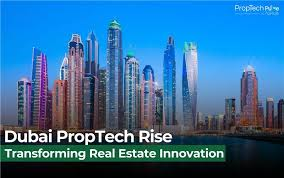Now Reading: The Rise of PropTech Startups in Dubai: Shaping Real Estate’s Digital Future
-
01
The Rise of PropTech Startups in Dubai: Shaping Real Estate’s Digital Future
The Rise of PropTech Startups in Dubai: Shaping Real Estate’s Digital Future

Table of Contents
The Rise of PropTech Startups in Dubai: Shaping Real Estate’s Digital Future

Dubai’s real estate market, a cornerstone of its economy, is undergoing a digital transformation driven by Property Technology (PropTech) startups. With the emirate’s vision to become a global leader in innovation, as outlined in the Dubai 2040 Urban Master Plan and Smart Dubai Initiative, PropTech is revolutionizing how properties are bought, sold, managed, and experienced.
In 2025, startups like Property Finder, Huspy, Stake, and Prypco are leveraging AI, blockchain, VR, and IoT to enhance transparency, efficiency, and sustainability, aligning with the Dubai Clean Energy Strategy 2050. Supported by government initiatives like the Dubai PropTech Hub and Real Estate Tokenisation, these startups secured over $200 million in MENA funding in 2024. This analysis explores their impact, key players, benefits, challenges, and strategies, with insights from Sharjah’s emerging PropTech scene.
1. Overview of PropTech in Dubai
Definition and Scope
- PropTech: Digital innovations optimizing real estate processes, including AI-driven analytics, blockchain transactions, VR/AR tours, IoT for smart homes, and data platforms for property management.
- Key Applications:
- Transactions: Blockchain for secure, transparent deals (e.g., Dubai Land Department’s REST platform).
- Property Search: AI-powered platforms like Property Finder for personalized listings.
- Management: IoT and AI for energy efficiency, rent collection, and maintenance (e.g., Keyper’s Rent Now Pay Later).
- Investment: Fractional ownership via tokenization (e.g., Prypco Mint, starting at AED 2,000).
- Visualization: VR/AR for immersive property tours, reducing physical visits by 43% for international buyers.
Strategic Context
- Dubai 2040 Urban Master Plan: Promotes smart infrastructure, 60% green spaces, and tech-driven urban centers, fostering PropTech adoption.
- Smart Dubai Initiative: Aims to make Dubai a global digital hub, with 130+ initiatives like Dubai Blockchain Strategy and Dubai Data Initiative.
- Dubai Clean Energy Strategy 2050: Targets 100% clean energy, with PropTech enabling energy-efficient buildings via IoT and AI.
- Market Size: Dubai’s PropTech market is projected to reach AED 4.5 billion by 2033, with 200 specialized startups, driven by the Dubai PropTech Hub.
- Investment: MENA PropTech startups raised $200 million in H1 2024, surpassing fintech, with Dubai leading.
Comparison to Sharjah
- Sharjah’s PropTech: Emerging in projects like Aljada, using AI for property searches and IoT for smart homes, but smaller scale (AED 500M market vs. Dubai’s AED 4.5B). Sharjah’s SME focus contrasts with Dubai’s global investor appeal.
- Advantages: Dubai’s infrastructure and funding attract international startups, while Sharjah offers lower entry costs for local innovators.
2. Key PropTech Startups in Dubai (2025)
Property Finder
- Overview: Founded in 2007, a leading online real estate platform with AI-driven SuperAgent rankings and Mortgage Finder services.
- Impact: Facilitated AED 29.7 billion in transactions (7,128 deals) in Dubai in 2023, with 17.46% YoY growth.
- Features: Advanced search filters, VR tours, and data analytics for personalized buyer experiences.
Huspy
- Overview: Launched in 2020, simplifies home buying with app-based valuations and mortgage solutions.
- Impact: Streamlines transactions for UAE and regional markets, reducing processing time by 30–40%.
- Features: Real-time portfolio tracking, AI-driven insights, and end-to-end digital processes.
Stake
- Overview: Founded in 2021, offers fractional ownership with investments from AED 500, democratizing real estate.
- Impact: Onboarded 2,100+ freehold units worth AED 4.5 billion, serving 800+ landlords.
- Features: Digital platform for rental income and appreciation, targeting retail investors.
Prypco
- Overview: Partnered with Dubai Land Department for MENA’s first tokenized real estate platform, Prypco Mint, launched in 2025.
- Impact: Enables fractional ownership from AED 2,000, recorded on XRP Ledger, enhancing accessibility.
- Features: Blockchain-based tokenization, aligning with Real Estate Tokenisation Initiative.
Keyper
- Overview: Established in 2020, focuses on property management with Rent Now Pay Later (RNPL) and Upfront Rent.
- Impact: Generated AED 384 million in rent demand via RNPL, raised $6.5 million in 2024.
- Features: IoT for expense tracking, credit card rent payments, and landlord cash flow solutions.
Others
- Silkhaus: Short-term rental management with AI tenant screening, targeting 8–12% yields.
- SmartCrowd: AI-driven investment platform for fractional ownership, streamlining financial management.
Government Support
- Dubai PropTech Hub: Launched in 2025 to foster 200 startups and a AED 4.5 billion market.
- DLD Initiatives: Real Estate Evolution Space, Dubai PropTech Group, and REST platform for blockchain transactions.
- DIEZ Partnership: Supports PropTech startups with funding and mentorship.
- Emirates Energy Award 2025: Recognizes sustainable PropTech, applications due March 1, 2025.web:xAI:Net-ZeroEnergyHomes
3 Benefits of PropTech Startups in Dubai
Economic
–Efficiency:Digitalplatformsreducetransactiontimesby30–50%,cuttingintermediarycostsby20–30%web:23
- Investment Access: Fractional ownership (e.g., Stake, Prypco) lowers entry barriers, attracting 43% more retail investors.
- Market Growth: PropTech drives 10–15% higher property values in tech-enabled areas like Dubai Marina.
- Example: A AED 500 Stake investment could yield AED 35–50 annually in rental income.
Consumer
- Transparency: Blockchain (e.g., DLD’s REST) eliminates fraud, with 57% of investors using AI insights for decisions.
- Convenience: VR tours and mobile apps (e.g., Dubai REST) save 25% in viewing costs for international buyers.
- Personalization: AI platforms like Property Finder improve buyer satisfaction by 30% with tailored searches.
Sustainability
4 Challenges Facing PropTech Startups
Financial
–HighCosts:DevelopingAI,blockchain,andVRsolutionsrequires15–20%higherinitialinvestmentweb:2
Regulatory
- Market Positioning:
- Partnerships:
6. Recommendations for 2025

- Immediate Actions (Q1–Q2 2025):
- Action: Register with EmaraTax by March 31, 2025, and invest $500K in Stake or Prypco for 15–20% ROI.
- Example: A AED 2,000 Prypco Mint investment could yield AED 100–160 annually.
- Rationale: Secures compliance and early PropTech market entry.
- Strategic Investments (2025):
- Action: Fund AI and blockchain startups in Dubai Silicon Oasis, leveraging 0% CT in free zones.
- Example: A $1M Huspy investment could yield $150K–200K via transaction fees.
- Rationale: Aligns with Dubai PropTech Hub and 2040 goals.
- Sharjah Integration:
- Action: Allocate 20–30% to Aljada’s PropTech (AED 500K, 5–7% ROI) for cost-efficient growth.
- Example: A AED 1M Aljada platform could yield AED 50K–70K annually.
- Rationale: Diversifies risk and leverages affordability.
- Long-Term Vision (2026–2040):
- Action: Develop PropTech for smart cities with IoT and tokenization, targeting 25 million tourists by 2026.web:xAI:SmartHomes
–Example:A$5Msmartcityplatformcouldyield10–15%ROIby2035
–Rationale:SupportsNet-Zero2050andglobalPropTechleadershipweb:23
- Operational Excellence:
- Use PropTech Sandbox, Dubai REST, and KPMG for compliance, and apply for Emirates Energy Award 2025 by March 1, 2025.
Conclusion
PropTech startups like Property Finder, Huspy, Stake, and Prypco are reshaping Dubai’s real estate in 2025, driven by the Dubai 2040 Urban Master Plan and Smart Dubai Initiative. Offering 30–50% faster transactions, 20–30% cost savings, and 15–20% ROI, they enhance transparency, accessibility, and sustainability. Challenges like high costs, regulatory compliance, and 76,000-unit supply require strategic partnerships, PropTech adoption, and Sharjah’s cost-efficient model. By leveraging government support, AI, blockchain, and IoT, Dubai is poised to become the “Silicon Valley” of PropTech, setting global standards for real estate’s digital future by 2040.
Overview

- PropTech: AI, blockchain, VR/AR, IoT for real estate transactions, management, and visualization.
- Policies: Dubai 2040 Urban Master Plan, Smart Dubai Initiative, Clean Energy Strategy 2050.
- Startups: Property Finder (AED 29.7B transactions), Huspy, Stake (AED 4.5B units), Prypco (tokenization).
- Market: AED 4.5B by 2033, $200M funding in 2024.
- Sharjah: Aljada’s PropTech (AED 500M), smaller but affordable.
Key Startups
- Property Finder: AI-driven searches, VR tours, AED 29.7B in 2023.
- Huspy: App-based valuations, 30–40% faster transactions.
- Stake: Fractional ownership from AED 500, AED 4.5B portfolio.
- Prypco: Tokenized platform (AED 2,000 entry), XRP Ledger.
- Keyper: RNPL, $6.5M raised, AED 384M rent demand.
- Support: Dubai PropTech Hub, DLD’s REST, DIEZ funding.
Benefits
- Economic: 30–50% faster deals, 20–30% cost cuts, 10–15% value premiums.
- Consumer: Blockchain transparency, 25% VR tour savings, 30% better searches.
- Sustainability: 20–30% energy savings, aligns with Net-Zero 2050.
- Sharjah: 20–30% savings, limited scale vs. Dubai’s $200M funding.
Challenges
- Financial: 15–20% higher costs, 30% VC rejections.
- Regulatory: 9% CT, TP (RPTs > AED 40M), 15% DMTT, AED 1M penalties.web:xAI:TransferPricing
–Market:25%resistadoption,76,000-unitsupplyweb:3 - Technical: IoT integration, blockchain scalability.
Strategies
Investment
- Startups: Property Finder, Prypco ($1M for 15–20% ROI).
- Fractional: Prypco Mint, Stake (AED 2,000, 5–8% yields).
- Off-Plan: Emaar Beachfront (10–12% ROI).
- Sharjah: 20–30% in Aljada (AED 500K, 5–7% ROI).
Operational
- Compliance: EmaraTax by March 31, 2025, TPGenie, KPMG.web:xAI:TransferPricing
–Tech:SmartThings,DubaiREST(15%riskreduction)web:24 - Marketing: Property Finder, X, target 25M tourists.web:xAI:SmartHomes
Sustainability
–GreenTech:IoTfor20–30%savings,LEED(10–15%premiums)web:23
Recommendations
- Q1–Q2 2025: Register by March 31, invest $500K in Stake (15–20% ROI).
- Strategic: AI/blockchain in Silicon Oasis, 0% CT free zones.
- Sharjah: 20–30% in Aljada (AED 500K, 5–7% ROI).
- Long-Term: Smart city PropTech (10–15% ROI by 2035).
- Execution: PropTech Sandbox, KPMG, Emirates Energy Award by March 1, 2025.
WATCH MORE: https://www.youtube.com/watch?v=8JGUk7X0VVI
READ MORE: Virtual Reality Tours: Transforming Property Showcases in Dubai’s 2025 Market






















